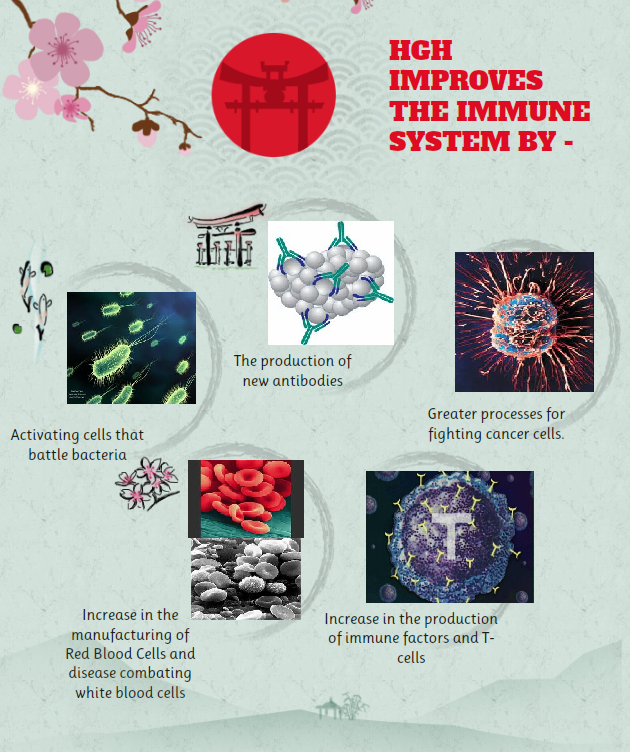GH TURNS BACK THE IMMUNE CLOCK
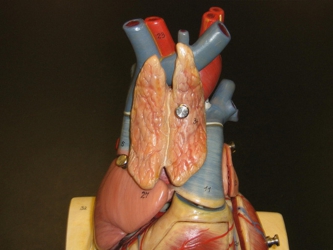 Scientists often had a doubt whether GH plays any role in the shrinking process or involution of the thymus gland. This gland which is situated behind on the top of the breastbone is considered as one of the prime organ of a human body’s immune system. For unknown reasons, it has been found out that the thymus gland begins to shrink at a young age of about 12 years.
Scientists often had a doubt whether GH plays any role in the shrinking process or involution of the thymus gland. This gland which is situated behind on the top of the breastbone is considered as one of the prime organ of a human body’s immune system. For unknown reasons, it has been found out that the thymus gland begins to shrink at a young age of about 12 years.
By age 40, it becomes shriveled shadow and by the time a person reaches 60 years of age, the gland is almost invisible and is difficult to be even found behind on the top of the breastbone.
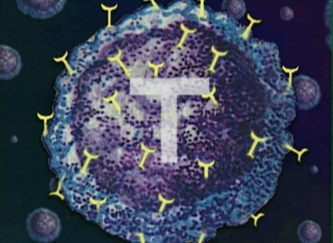 The thymus gland is important for the development of the T-cell lymphocytes. T-Cell lymphocytes are the main soldiers that fight against all odds of diseases.
The thymus gland is important for the development of the T-cell lymphocytes. T-Cell lymphocytes are the main soldiers that fight against all odds of diseases.
It is these T-Cell lymphocytes which actually fight against the deadly AIDS virus and when they fail to function, AIDS captures the whole body of a person and eventually kills him.
When the thymus gland begins to shrink with age, many other diseases which occur due to aging process such as cancer, autoimmune & other infectious diseases takes effect and begin to build up in a human body.
Simultaneously, there occur declines in the T-cells along with the immune factors like Interleukin 2. In short, aging can be considered as a slow form of the deadly disease AIDS.
According to Dr. Kelley, ‘The Thymus gland is considered as the key biomarkers for aging’.
He is surprised with the fact that by the time a human being attains puberty with growth hormone at its highest, the thymus gland begins to shrink.
This is actually the time when humans burst with activity and their body bones begin to grow and shoot up. As a person grows in age, their thymus gland begins to become smaller & the growth hormone goes down. Is there any connection between the two? He kept wondering.
To try out this research, he tested it by injecting GH3 cells in old rats whose thymus glands had nearly disappeared. These cells are grown inside a laboratory which secrete high quantity of Growth Hormone (GH).
To his surprise, his experiment was successful. The Thymus gland began to grow back in old rats and was as big and strong as that which was found in younger rats.

Hgh and Chemotaxis
Chemotaxis provides a greater immune response which gets triggered by encroachment of different infecting agents.
Chemotaxis is a type of signal which calls for high amount of immune cells mostly to the site where you find all the bacteria and viruses.
Human Growth Hormone (HGH) has proved to increase the body’s chemotactic response. It drives more macrophages to the infected site which will engulf and kill all the infecting agents.
GH LINKS MIND AND BODY
Recently scientists have found that growth hormone is made not only by the pituitary gland but by the lymphocyte cells of the immune system.
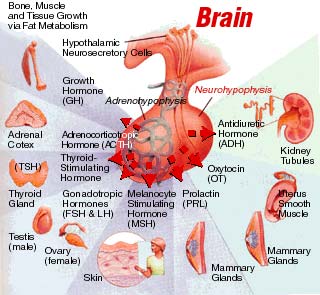 There are receptors in both the immune system and the neuroendocrine system for all the important players in the action of growth hormone, that is, growth hormone itself, growth hormone-releasing hormone, somatostatin, and IGF-1.
There are receptors in both the immune system and the neuroendocrine system for all the important players in the action of growth hormone, that is, growth hormone itself, growth hormone-releasing hormone, somatostatin, and IGF-1.
While the details of how growth hormone from the brain and that produced in the immune system affect each other have yet to be worked out, the important and fascinating thing is that growth hormone serves as a connecting link between the mind and the body.
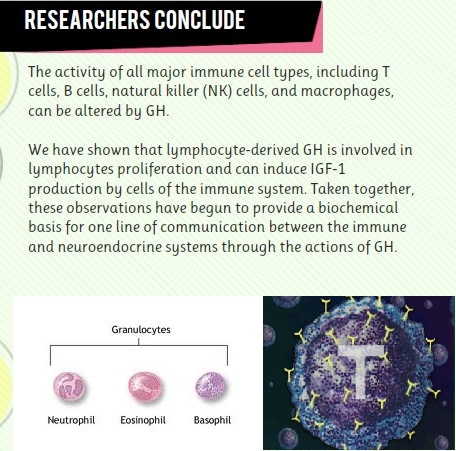
If, indeed, the brain and the immune system talk to each other through the medium of growth hormone, it could explain how the stimulation of GH could have such a therapeutic effect on the mind, the emotions, and the resistance against disease.
GH = ENHANCED IMMUNITY = INCREASED LIFE SPAN
Increased immunity not only means less disease but a longer, healthier life span. In fact, many gerontologists believe that the immune system is the key to longevity.
Scientists have shown a one-third extension of average life span in older mice treated with growth hormone and agree that growth hormone may rejuvenate the immune system and not just by bringing back cells that have disappeared with age.
Since the receptors for Growth Hormone (GH) are located at human lymphocytes, and the potential of hgh to be able to influence and adjust the immune reactions in animals, both demonstrate a link between Growth Hormone and the immune functions in man.
Hgh has a comprehensive effect on immune system
When a person attains puberty age, their thymus gland performs at the highest level. Later as the years pass by, the same thymus gland starts shrinking.
By the time a person reaches the age of 40 years, this gland is barely visible and detectable. And by the time they reach 60 years of age, it is almost difficult to find out the thymus gland.
HGH therapy truly helps in regrowing and redeveloping diminishing and shrinking organs and also the thymus gland. Hgh improves the immune activities including –
– The production of new antibodies.
– Greater processes for fighting cancer cells.
– Increase in the production of immune factors and T-cells.
– Greater activity levels and amounts of disease combating white blood cells.
– Activating cells that battle bacteria.
– Increase in the manufacturing of Red Blood Cells.
